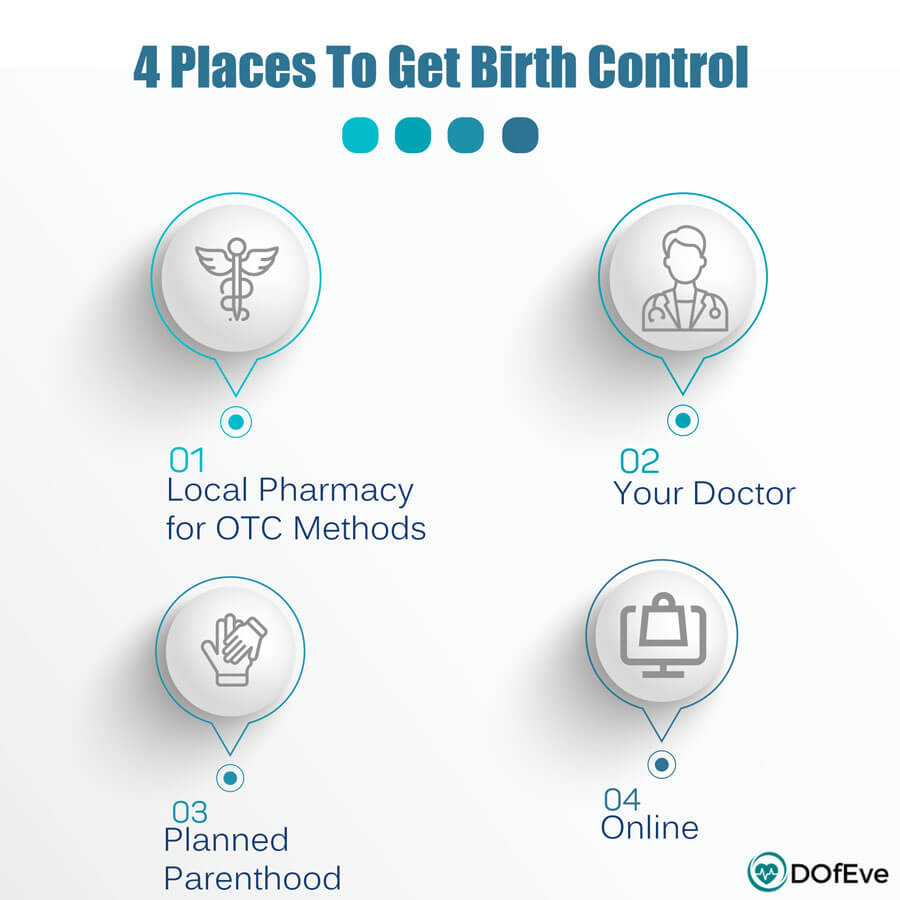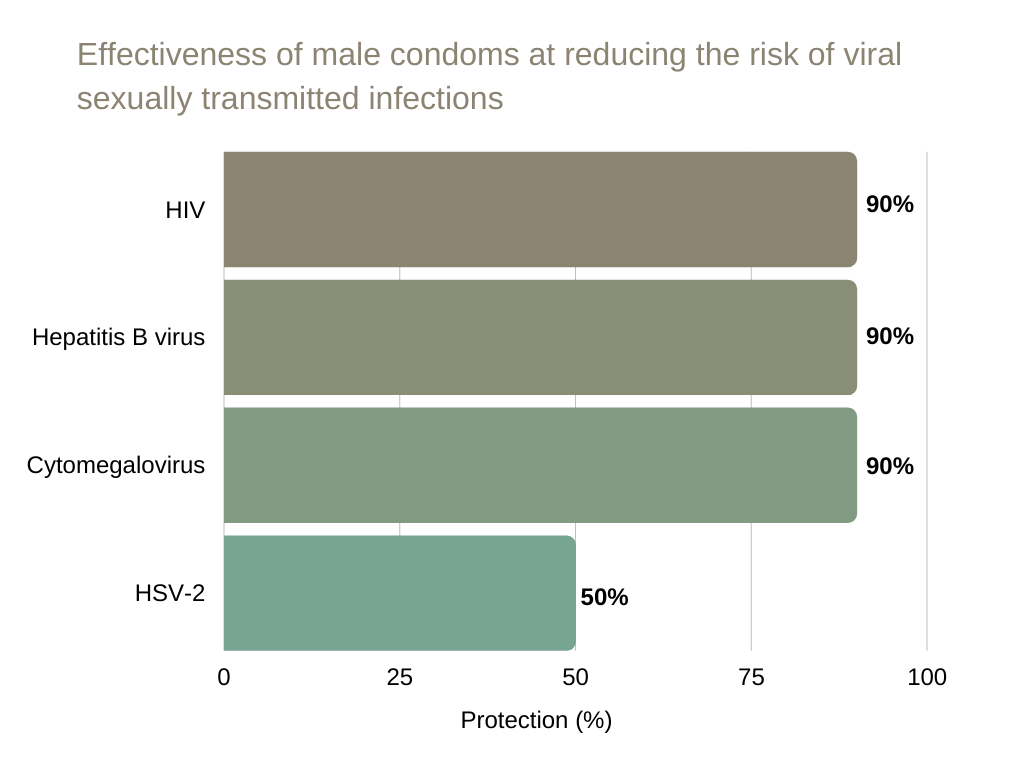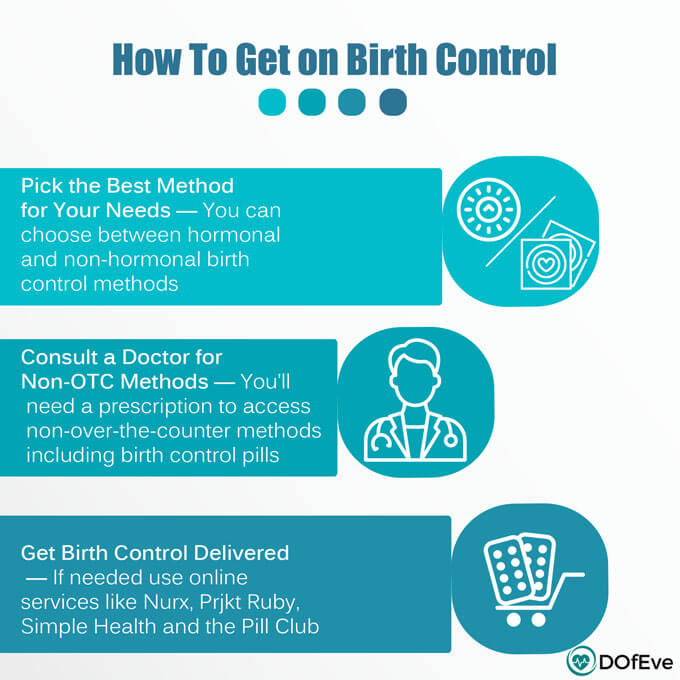
Accessing effective birth control may be one of the most important turning points in women’s lives. But birth control campaigners believe that still millions of women in the U.S. live in ‘contraceptive deserts’, meaning, women who could get pregnant but cannot get basic services to plan or avoid pregnancy.
Information is key to changing this, and we’re going to share with you the different kinds of birth control and how to get birth control that suits your body and lifestyle.
Key Takeaways
- How you get your birth control depends on what type you need.
- The best method for you depends on your lifestyle and sex life.
- Have an honest conversation with yourself and a professional about intercourse to decide what’s best for you.
- If you have more than one sexual partner, you will need a method to protect you from STDs, such as condoms.
- Hormonal options, such as the shot, the patch or birth control pills, can have side effects. That is why they require a consultation with a doctor or nurse.
- The most reliable methods of birth control for preventing pregnancy, such as the implant and the IUD, can only be accessed through a doctor.
How To Get Birth Control
How you get your birth control will depend on the type you would like to use, but many require an appointment and prescription. All birth control options should be available at a doctor’s office or Planned Parenthood clinic. A lot of methods are now also available online (especially for repeat prescriptions) and some you can buy in pharmacies.
Your options for access may also be affected by your insurance plans.

Local Pharmacy for OTC Methods
All barrier and topical methods, i.e. condoms, caps, and spermicide are available over the counter. They can be sourced from your local pharmacy or grocery store without prescriptions or appointments. Some brands of emergency contraception can be picked up at the drug store too.
Below is a complete list of over the counter contraceptives and some information:
- Condom: A thin tube of latex stretched over the penis during intercourse to protect against STDs and conception.
- Cap or diaphragm: A circular dome of latex that is inserted into the vagina before intercourse, preventing sperm from reaching the cervix.
- Female condom: Condoms for women are latex tubes that are inserted into the vagina before intercourse.
- Spermicide: A gel that is used during intercourse to kill sperm, also found on condoms.
- Birth control sponge: A small sponge that is soaked in spermicide and inserted into the vagina before intercourse, preventing pregnancy.
- Emergency contraceptives: The ‘morning after pill’, if you have had unprotected intercourse in the last 72 hours, stops conception.
How effective do you think condoms are at protecting against HIV?


With a prescription from a doctor, you may also be able to get birth control pills or progesterone shots at a pharmacy, depending on what state you live in.
Your Doctor
Your doctor can offer you advice about all types of available birth control and can make an assessment on which option might fit your age, weight, health, and hormones, with the fewest adverse effects.
When consulting with a doctor or nurse about the best birth control for you, expect to discuss these important points:
- Do you have particularly heavy or painful periods that you would like to manage with hormonal birth control?
- Is it realistic for you to remember to take a pill at the same time every day?
- Is it realistic for you and your partner to use a barrier method (cup, condom or diaphragm) every time you have intercourse?
- Do you want to have children at some point in your life or soon?
- Do you have casual intercourse and need protection from STDs?
Based on their assessment, the doctor or nurse will recommend a hormonal or non-hormonal type of birth control and tell you about costs.
Hormonal methods slightly increase the risk of blood clotting, especially if you have high blood pressure or certain underlying health conditions, which is why it is good to check in with a health professional [1].
The doctor or nurse may also give you a pelvic examination and should check your blood pressure, weight and BMI. During your first appointment, be prepared to be asked about some personal topics, like:
- Are you sexually active?
- How many sexual partners have you had in the last 12 months?
- Have you had unprotected intercourse?
- Have you ever had a sexual health check?
- When was your last period?
- Do you have any underlying health conditions, such as high blood pressure or diabetes?
- Have you had any STDs before?
- Have you been pregnant before?
- Do you have any signs or symptoms of STDs?
Planned Parenthood
Planned Parenthood is a non-profit family planning service provider that operates in all states across the U.S. They have sexual health clinics that can be accessed at affordable prices and with all insurance plans, where you can book an appointment with a doctor or nurse. You can locate the nearest Planned Parenthood health office online via their website or give them a call.
Is It Safe To Get Birth Control Online?
Yes, birth control can be safely bought online. However, it is best to first have an appointment with a gynecologist or nurse, especially if it is your first time getting contraceptives.
Online birth control platforms, such as Nurx, now offer telemedicine—contraception to order. They sell various types of birth control, with delivery, and offer online prescriptions at low costs, but are not to be substituted with your regular health care.
Take a look at our Nurx review to see what other people think about the online birth control service or if you have questions.
Prescriptions are provided by the online private company following a medical review and consultation, based on the information you give them.
Keep in mind, online services are not meant to replace primary health checkups. Medical professionals say there is more to getting a prescription than simply inputting basic health information.
Once you are confident about your reproductive health, and you have found a birth control method that suits your body—ordering your contraception online may be a convenient way of accessing it.
How To Get on Birth Control
The best place to start, especially for a longer-term method, would be with a visit to the doctor’s office or an appointment with a sexual health nurse or doctor at a clinic. There you can have questions answered about birth control and get a health and reproductive health check-up, followed by a prescription.

Pick the Best Method for Your Needs
Some women like to control their menstrual cycles with hormonal methods like the pill due to heavy periods and bad PMS. Hormonal treatments can stop a woman’s periods altogether, which can be seen as a blessing for those who have struggled for years with their premenstrual symptoms.
Other women may find stopping their periods invasive and prefer their natural hormones and cycle. In which case, non hormonal birth control methods are more suitable.
Hormonal birth control has been known to create mood swings and is sometimes linked to depression [2]. Birth control pills may not be suitable for all women, particularly those who are overweight, who smoke, or have high blood pressure, due to a slightly increased risk of cardiovascular problems [3].
Condoms are essential for safe intercourse, especially if you have different sexual partners. However, condoms may not suit couples who require a more reliable and long-term method.
If you feel you can communicate with your partner during intercourse and share some of the responsibility of birth control, there may be more options available to you, such as the fertility awareness method. If male birth control options interest you and your partner, they would also be worth considering.
Consult a Doctor for Non-OTC Methods
You will need a prescription to access non-over-the-counter methods including birth control pills.
Getting a prescription usually involves an appointment with a doctor or nurse. It is safer to talk with a medical professional and get a check-up, especially if you haven’t done so before or for more than six months. They can also advise you on what birth control is covered by which insurance plans.
You can discuss what method of birth control might suit you best and how to use it, before getting a prescription to try it or ordering it online.
Non-Over-The Counter-Methods that should be available to you are:
- The contraceptive pill: A daily pill containing the hormones progesterone or oestrogen (depending on the type) to stop ovulation.
- The shot: An injection of progesterone taken once every 12 weeks to stop ovulation.
- The patch: A sticky patch on the skin that releases hormones into the bloodstream and is replaced weekly.
- Vaginal rings: A small plastic ring that is inserted into the vagina and releases progesterone and oestrogen into the blood.
- The implant: A tiny straw-like implant is placed under the skin in your arm where it releases hormones for up to three years. It has to be fitted by a doctor or nurse.
- IUD, intrauterine device: A small ‘t’ shaped piece of plastic or metal that sits just inside the uterus. There is also a non-hormonal type, which also has to be fitted by a doctor or nurse.
How To Get Birth Control Pills Without a Prescription?
It is not generally possible or recommended to use the birth control pill without a prescription in the U.S. Doctors give prescriptions following an appointment or you could speak to a doctor on an online platform.
How To Get Birth Control Delivered
Websites such as Nurx, Prjkt Ruby, Simple Health and the Pill Club offer free delivery of various types of birth control. Nurx delivers and provides services in 33 out of 50 states and has some pretty good reviews.
You can visit their websites to assess which company might work best for you, but first, be sure to read all about the best birth control delivery services here.
FAQ
A few of your most common birth control questions answered!
Can You Buy Birth Control Pills Over the Counter?
In most states, you can pick up birth control pills from the pharmacy, but first, you need to get a prescription. Because of this birth control pills are not technically an over-the-counter method.
How Can I Get Birth Control Refill Without Doctor?
When you have your ongoing prescription, you do not need to worry about seeing a doctor to get your refill each time. However, it is a good idea to review your birth control choice with a doctor every six months to one year and get a health care screening, regardless of what method you use.
Does Insurance Cover Birth Control?
Yes, since the Affordable Care Act, most insurance plans must cover all methods of birth control free of charge, by law. However, some plans only cover certain brands of birth control pills or generic versions. Your health care insurance provider can tell you which brands of birth control they pay for.
How To Get Birth Control Without Insurance
If you do not have insurance, you can still access many methods of birth control at the pharmacy when you have got a prescription. You may have to pay a fee for the appointment, or depending on your income, you could qualify for government care such as Medicaid that would cover the costs.
How Much Do Birth Control Pills Cost?
Depending on your insurance and benefits, as well as the brand that you use—birth control pills can cost between $0-$50 per month.
How Do You Ask for Birth Control?
The first step would be to book an appointment with your regular doctor, a gynecologist, at your local health office or Planned Parenthood center. They can help you to get a prescription that’s right for you. They can also offer you all types of birth control including the IUD, the implant or shot, as well the contraceptive pill.
Can I Get Birth Control Without My Parents Knowing?
All health providers are bound by terms of confidentiality, meaning they cannot talk to your parents about your medical record or your sex life.
However, if you are using your parent’s insurance plan and are concerned about how much information is available in the family, it is worth checking the insurance provider account to see what shows up on the itemized list. You can also inquire with them about the possibility of keeping information that is sensitive to you, private.
How Long Does It Take To Get Pregnant After Stopping Birth Control?
You can get pregnant as soon as you ovulate after stopping birth control. Even if you miss one pill, you are at risk of getting pregnant for the following week. Fertility studies show that around half of women who stop birth control get pregnant within the first 3 months and most women get pregnant within 12 months after discontinuing birth control [4].
Conclusion
Accessing birth control may seem a little intimidating to begin with. Online options may seem like an easier or friendlier option and have received some great reviews. However, always remember that they are not meant to replace your primary health care provider.
Ensure that you are fully informed on your choices to get the best contraceptive for you and your lifestyle. With all methods of birth control, accidents can still happen, so be flexible and ensure you know what to do in an emergency, such as the best place for you to source emergency contraception.
References
- National Research Council (US) Committee on Population. “Contraceptive Benefits and Risks.” Contraception and Reproduction: Health Consequences for Women and Children in the Developing World., U.S. National Library of Medicine, 1 Jan. 1989, www.ncbi.nlm.nih.gov/books/NBK235069/.
- Lewis, Carolin A, et al. “Effects of Hormonal Contraceptives on Mood: A Focus on Emotion Recognition and Reactivity, Reward Processing, and Stress Response.” Current Psychiatry Reports, Springer US, 7 Nov. 2019, www.ncbi.nlm.nih.gov/pmc/articles/PMC6838021/.
- Shufelt, Chrisandra L, and C Noel Bairey Merz. “Contraceptive Hormone Use and Cardiovascular Disease.” Journal of the American College of Cardiology, U.S. National Library of Medicine, 20 Jan. 2009, www.ncbi.nlm.nih.gov/pmc/articles/PMC2660203/.
- Girum, Tadele, and Abebaw Wasie. “Return of Fertility after Discontinuation of Contraception: a Systematic Review and Meta-Analysis.” Contraception and Reproductive Medicine, BioMed Central, 23 July 2018, www.ncbi.nlm.nih.gov/pmc/articles/PMC6055351/.



Leave a Reply